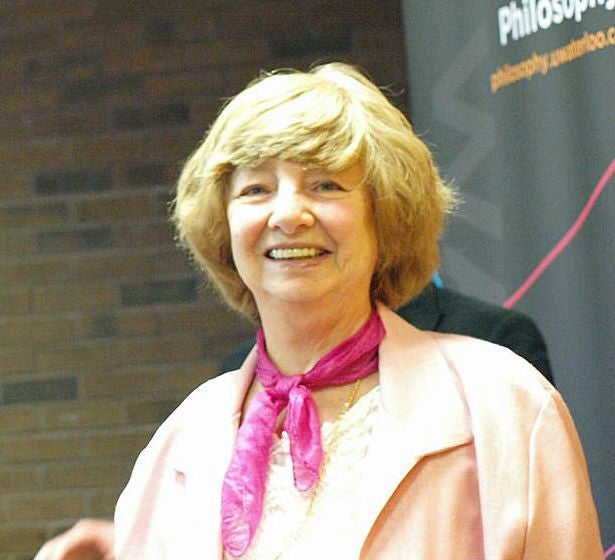
Judy was born in Brooklyn, New York, in 1934. She received a BA from Swarthmore in 1955, and her MA and Ph.D. from Yale. Her 1963 dissertation was titled A Study of the Rationality in Kant’s Critique of Aesthetic Judgment. After a short stint as a Lecturer at Northeastern University, she joined the Waterloo Philosophy Department in 1965, where she worked until her retirement in 2002. She continued to work on Kant, including translating work on his philosophy of mathematics, and also made occasional forays into political philosophy.
Judy was a well-known figure on the Waterloo Campus throughout her career. She was never shy about speaking up in defense of what she thought was right and regarded herself as a staunch advocate of free speech. As the then-University President David Johnston phrased it when he conferred the designation Professor Emerita on her, she was “a conscientious discussant at Arts Faculty Council and diligent in defending the interests of faculty members across campus.”
It is as a mentor and friendly supporter of many students during her long teaching career that Judy probably made her most important contribution. She often went out of her way to make students, especially international students or students who seemed isolated, feel at home at Waterloo. One faculty member, Shannon Dea, was an undergraduate student of Judy’s and her memories give a feel for a side of Judy that those who only know her by her higher-profile activities on campus might miss:
"Judy was one of my first-ever Philosophy professors. In the Fall of 1989, in the first term of my undergrad, I took "Great Works of Western Philosophy" with her. I loved the course and I loved her teaching. She was old-fashioned in a way that, at the time, I was looking for in a philosophy professor. She treated the canon reverently; this really resonated with me at the time. She was also fiercely supportive of her students. I recall I had to ask for an extension on a paper because I wasn't doing an outstanding job juggling work and school. She asked me why I had a job, in addition to being a student. I told her that my job was my only way of paying rent. This really upset her. "Oh, why can't they just let students be students?" she complained. (She gave me the extension.)
As it happens, the job in question was at a local restaurant. I remember that Judy often used to bring undergraduate students to restaurant and buy meals for them. She was always a really generous woman. At the end of the course I took with her, she invited the whole class to her apartment for a potluck dinner. This really meant a lot to me. It was the first time I had ever been welcomed to a professor's home, the first time that I ever shared a meal with a professor. Another student in the class and I were both vegans. Judy was far from vegan, but she managed, in her own way, to make the two vegans feel really welcome by explaining to us Plato's reasons for excluding meat from the diet of the citizens of the Republic. Years later when I became a professor, I followed Judy's model and held student potlucks at my house at the end of term. I wanted to make my own students feel as welcome and supported as Judy made me feel. (I don't host these potlucks so often anymore, but I still think very fondly of the practice.)
Over the years, my views about philosophy and pedagogy and about the world, in general, drifted pretty far from Judy's. By the end, we didn't agree on much. But she was the first woman philosopher I ever met, and she was a kind a generous teacher to me. For these reasons, I will remember her with great fondness."